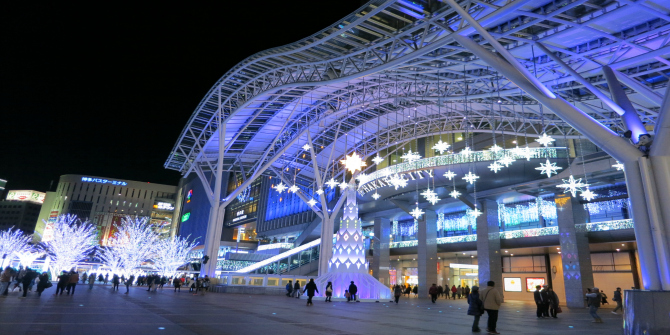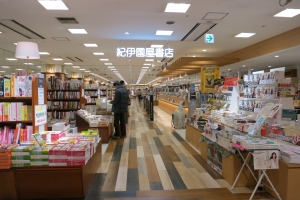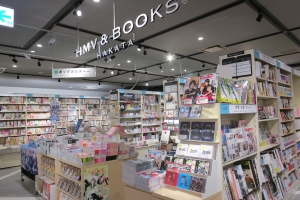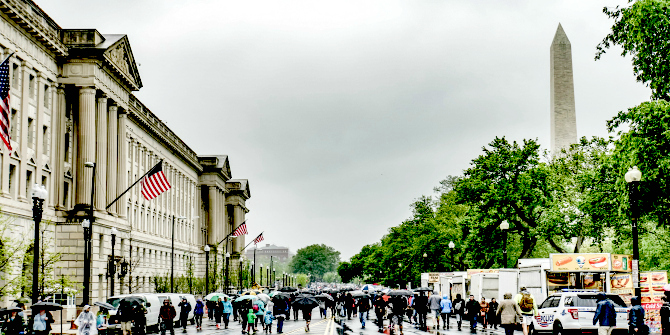Hung-Ya Lien takes us on a tour of the best bookshops in Fukuoka, Japan. If there’s a bookshop that you think other students and academics should visit when they’re undertaking research or visiting a city for a conference, further information about contributing follows this article.
 Hakata Station, Fukuoka, Japan
Hakata Station, Fukuoka, Japan
Instead of writing a bucket list, I find it more appealing to simply go ahead and do things and then list them to my delight. My trip to Fukuoka in December 2016 can be roughly summed up like this: visiting Fukuoka for the second time, checked; celebrating New Year’s Eve in a jinja (神社), checked; spending too much money in post offices, checked; compulsively visiting at least three bookshops, checked; still not making progress in speaking Japanese, definitely checked.
 Not only does Kinokuniya (紀伊國屋) have many branches in Japan, but it has also expanded its footprint overseas. The one I visited sits on the sixth floor of Fukuoka Bus Terminal. In addition to a huge comic books section, I spied a children’s play area, an incredible selection of academic materials and a long stretch of Japanese and world literature. An NHK Taiga drama (大河ドラマ) section was also indispensable. What I found most fascinating was the reference materials for university entrance exams at the back of the shop. A jinja model sat among the books and the name of the god of learning, Sugawara no Michizane (螢雪天神/菅原道真), was written on a poster. This was such thoughtful and delicate furnishing as January and February mark the exam season for Japanese students. I suppose one would not mind having a bit of luck from the god of learning when purchasing books in this shop.
Not only does Kinokuniya (紀伊國屋) have many branches in Japan, but it has also expanded its footprint overseas. The one I visited sits on the sixth floor of Fukuoka Bus Terminal. In addition to a huge comic books section, I spied a children’s play area, an incredible selection of academic materials and a long stretch of Japanese and world literature. An NHK Taiga drama (大河ドラマ) section was also indispensable. What I found most fascinating was the reference materials for university entrance exams at the back of the shop. A jinja model sat among the books and the name of the god of learning, Sugawara no Michizane (螢雪天神/菅原道真), was written on a poster. This was such thoughtful and delicate furnishing as January and February mark the exam season for Japanese students. I suppose one would not mind having a bit of luck from the god of learning when purchasing books in this shop.
 HMV & Books Hakata is in the Kitte building next to Hakata Station, and opened in April 2016 (the first branch was in Shibuya, Tokyo). The shop offers a comprehensive range of entertainment, culture and lifestyle merchandise, with music and movies as the pillars. I love how they decorate the shop using various J-POP-related goods. Furthermore, the shop highlights writers and artists from Kyushu. It even had a Softbank Hawks corner, dedicated to the local baseball team. Book retailing nowadays is in decline, and it is sad to see shops closing down because they are not making enough profits compared to their online counterparts. A compound shop like HMV & Books is a natural evolution of the modern-day bookshop, and I appreciated seeing how creative and enlightening a book/entertainment retailer can be.
HMV & Books Hakata is in the Kitte building next to Hakata Station, and opened in April 2016 (the first branch was in Shibuya, Tokyo). The shop offers a comprehensive range of entertainment, culture and lifestyle merchandise, with music and movies as the pillars. I love how they decorate the shop using various J-POP-related goods. Furthermore, the shop highlights writers and artists from Kyushu. It even had a Softbank Hawks corner, dedicated to the local baseball team. Book retailing nowadays is in decline, and it is sad to see shops closing down because they are not making enough profits compared to their online counterparts. A compound shop like HMV & Books is a natural evolution of the modern-day bookshop, and I appreciated seeing how creative and enlightening a book/entertainment retailer can be.
I expected Tenro-in Books & Coffee (天狼院書店) to be another spacious chain store when my friend mentioned it. Instead, the Fukuoka branch is situated on the second floor of a seemingly residential building, and the shop floor is occupied by tables and shelves, leaving rather narrow pathways for visitors. Customers are welcome to sit down for drinks. I adored its wood-coloured interior. The heating caught me off-guard and made me forget the bone-chilling winter cold quickly. I was well distracted by the novelties inside, such as the kotatsu by the window, books covered by black papers so that customers could be surprised by which title they purchased, fukubukuro (福袋) for the New Year, etc. Mostly the shop sells literature, but there is also a wall of reference books for English exams.
 The shop manger gave me the warmest welcome and paid close attention to me after being told that I came from Taiwan. My Japanese is very limited, but her English was perfect anyway. She was eager to explain the merchandise and gave me permission to take photos and even blog about the bookshop. So here I am, writing down my experience. During my stay, there happened to be a Japanese TV crew shooting for their programme, and perhaps because I was the only ‘new’ visitor from the moment I walked in, the camera followed me up close, especially when the manager talked to me. I thought my favourite phrase in Japanese — ichigo ichie (一期一会), which means ‘for this time only’ — after leaving the shop. We might never cross paths again and certainly would not re-live that very moment, but I did fully embrace and cherish every second of her hospitality and kindness.
The shop manger gave me the warmest welcome and paid close attention to me after being told that I came from Taiwan. My Japanese is very limited, but her English was perfect anyway. She was eager to explain the merchandise and gave me permission to take photos and even blog about the bookshop. So here I am, writing down my experience. During my stay, there happened to be a Japanese TV crew shooting for their programme, and perhaps because I was the only ‘new’ visitor from the moment I walked in, the camera followed me up close, especially when the manager talked to me. I thought my favourite phrase in Japanese — ichigo ichie (一期一会), which means ‘for this time only’ — after leaving the shop. We might never cross paths again and certainly would not re-live that very moment, but I did fully embrace and cherish every second of her hospitality and kindness.
Fukuoka is the gateway to Kyushu. Apart from the literary feasts provided by good quality bookshops in the city, one can also and must taste authentic regional cuisines, such as Hakata ramen, mentaiko and motsunabe (offal stew), to make the trip complete.
Hung-Ya Lien is from Taiwan. She graduated with an MSc in Politics and Government in the EU from LSE in 2008. She was once a Sales Assistant in Zavvi and HMV in London.
Note: This bookshop guide gives the views of the author, and not the position of the LSE Review of Books blog, or of the London School of Economics. Thank you to Hung-Ya Lien for providing the images.
Do you have a favourite bookshop? If there’s a bookshop that you think other students and academics should visit when they’re undertaking research or visiting a city for a conference, then this is your chance to tell us all about it.
As part of a regular feature on LSE Review of Books, we’re asking academics and students to recommend their favourite two or three bookshops in a particular city, with the aim of building an exciting online series for our book-loving community of readers the world over.
Bookshops could be academic, alternative, foreign language, hobby-based, secret or underground institutions, secondhand outlets or connected to a university. We’d like to cover all world regions too.
If something comes to mind, we’re looking for around 150 words per bookshop, detailing why each place is a must-see. Our editorial team can then find suitable photos and links to accompany the piece, though you’re welcome to supply these too. We only ask that you focus on just one city or region, and two or three bookshops within it.
Email us now if you’d like to contribute: lsereviewofbooks@lse.ac.uk








Good review! Thanks for picking Fukuoka bookshops for this review. I am from Fukuoka, and graduated LSE with MSc in Politics and Government in 1981.